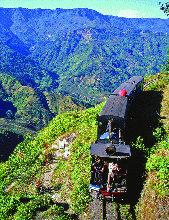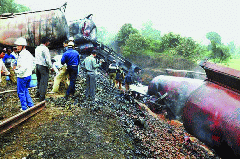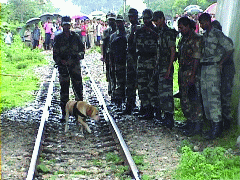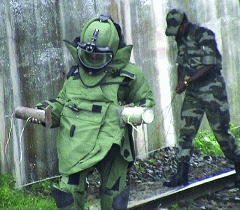Archives
Railways Easy Targets For Insurgents
The Northeast Frontier Railways incurred a direct visible loss of more than Rs. 3 Crore due to the sabotage. The actual loss was much more, according to railway authorities. The accumulated loss of repairing the damaged oil tankers, restoration of damaged railway tracks, payment for tickets due to cancellation and rescheduling of passenger trains accounted for more than 10 Crores.
 The November 16 incident was one of a total of 27 extremist sabotage, attack, ambush and bomb blast incidents targeting NF Railways perpetrated by different militant groups in Assam, recorded by the railway authorities till November 16 in 2009 alone. As railways have become the soft target of insurgent groups of the Northeastern states, frequent suspension of passenger trains and goods trains for indefinite periods, withdrawal of night trains, and the uncertainty of railway journeys have become a regular phenomenon in Assam which also affects the people, economy and the development processes in all other northeastern states. In 2007, the number of sabotage incidents by militants in Assam was 11 in 2007. The same increased to 16 in 2008.
The November 16 incident was one of a total of 27 extremist sabotage, attack, ambush and bomb blast incidents targeting NF Railways perpetrated by different militant groups in Assam, recorded by the railway authorities till November 16 in 2009 alone. As railways have become the soft target of insurgent groups of the Northeastern states, frequent suspension of passenger trains and goods trains for indefinite periods, withdrawal of night trains, and the uncertainty of railway journeys have become a regular phenomenon in Assam which also affects the people, economy and the development processes in all other northeastern states. In 2007, the number of sabotage incidents by militants in Assam was 11 in 2007. The same increased to 16 in 2008.
In May 2008, as many as five attacks and ambushes were carried out by suspected Dima Halam Daoga (Jewel Garlosa) militant group in Lumding division alone, which claimed the lives of 10 persons and injured several others. During the two months between April and May 2009, NF Railways recorded as many as 11 incidents of ambush, attack, bomb blasts, and sabotage in the form of track tampering incidents by the militant organisation. Out of the five divisions of NF Railways including Tinsukia, Lumding, Rangiya, Alipurduar and Katihar, the Lumding division has been a frequent target for sabotage activities, as suspected DHD (J) militants were very active in this part of the state till they came overground on October 2, 2009, deposited their weapons and moved to designated camps to pave the way for a peace dialogue with the government.
Barring a measly 8 incidents, all the 54 incidents triggered by different militant groups which took place during the last three years were in the Lumding division, the records of the railway authorities say.
Frequent insurgent activities have also compelled the railway authorities to suspend two major trains namely Barak Valley Express and Cachar Express connecting Silchar with Lumding for a period of 16 months from May 15, 2008. These two important train services were resumed only recently from October 20, 2009 after the security situation improved following the deposition of weapons by DHD (J) militants and area domination by security forces to provide track security of the hill section.
The Lumding-Silchar train- route is extremely important as it is known to be the lifeline not only for South Assam but also for Tripura, Mizoram and Manipur which it connects. When the railway authority has to suspend trains for over a period of time, particularly the goods-trains, it also severely affects the buffer-stock of food-grains and supply of other essential commodities to these three Northeastern states, Mr. S.S Hajong, Chief Public Relation Officer of NF Railways tells Eastern Panorama.
The CPRO says that with railways being the lifeline of the nation, they have always been identified as easy  targets by insurgent groups. Hitting the railways is the easiest way of getting instant national publicity. Apart from the inconvenience caused to passengers and the visible damage, railways often have to incur losses which may not be visible to the ordinary citizen. For instance, apart from the compensation to concerned authorities due to the loss of human lives or property, restoration of railway lines after the damage caused by insurgency attacks involves huge amounts of money, which is often not taken note of.
targets by insurgent groups. Hitting the railways is the easiest way of getting instant national publicity. Apart from the inconvenience caused to passengers and the visible damage, railways often have to incur losses which may not be visible to the ordinary citizen. For instance, apart from the compensation to concerned authorities due to the loss of human lives or property, restoration of railway lines after the damage caused by insurgency attacks involves huge amounts of money, which is often not taken note of.
Frequent insurgent activities have forced the railways authorities to think up innovative security steps, apart from the normal patrolling and increasing security vigil provided by the state government. One of the most innovative and effective ideas is the introduction of bullet-proof locomotives, the CPRO says. “Since 2008 NF Railways has started operating bullet-proof locomotives as part of improved security measures in the Lumding division. This unique idea, in fact was for the first time introduced in the world. As of now the NF Railways has introduced 35 bullet-proof locomotives running entirely in Lumding division only,” he says.
Apart form the bullet-proof locomotives the railway authorities have also made provisions for bunker-type guard-vans in various goods-trains. These guard-vans are specially constructed with thick iron-plates for the safety of security guards. However, all these require huge funds which otherwise could have been utlitised for further improvement of passenger amenities and in railway infrastructure projects had there been a secure environment free from any insurgent sabotage activities in the region.
 Dilip Chandra Borah, a senior official of the Construction Department of N.F. Railways, states that construction works have been going on under 10 different National Projects, and all these projects are located in severely insurgency affected areas. Out of these 10 National Projects, eight are new and only two are gauge conversion projects. These projects include the proposed 30 kilometer long Azara-Byrnihat railway expansion project which has been included as a National Project, Mr. Borah says that although it was originally from Azara to Byrnihat, due to public protest against the construction of railway tracks through the Deepar Beel area in Guwahati, the railway line has been shifted to Tetelia and Byrnihat. Assam shares 12 kilometers of the track, while Meghalaya shares 18 kilometers. The survey has already been completed and it has now been sent to the Railway Board for sanction. Mr. Borah is hopeful of the sanctioning of the project during the next budget session.
Dilip Chandra Borah, a senior official of the Construction Department of N.F. Railways, states that construction works have been going on under 10 different National Projects, and all these projects are located in severely insurgency affected areas. Out of these 10 National Projects, eight are new and only two are gauge conversion projects. These projects include the proposed 30 kilometer long Azara-Byrnihat railway expansion project which has been included as a National Project, Mr. Borah says that although it was originally from Azara to Byrnihat, due to public protest against the construction of railway tracks through the Deepar Beel area in Guwahati, the railway line has been shifted to Tetelia and Byrnihat. Assam shares 12 kilometers of the track, while Meghalaya shares 18 kilometers. The survey has already been completed and it has now been sent to the Railway Board for sanction. Mr. Borah is hopeful of the sanctioning of the project during the next budget session.
Addressing the security threat:
The Standing Committee on Railways of the Ministry of Railways of the Fourteenth Lok Sabha, in its 27th report on Demands For Grants for 2007-08 states that “Railways have become a soft target for terrorists, naxalites and other disruptive forces causing the loss of innocent lives and the loss of property of Railways and passengers. Such incidents also create a sense of insecurity and fear psychosis among the Railway passengers. They also note that in the wake of recent bomb blasts in Delhi-Attari link express and Mumbai sub-urban trains and Lumding-Silchar incident, Railways have taken steps to strengthen and modernize security arrangements such as the installation of explosive detection devices, door-frames and hand held metal detectors, CCTV and smart video cameras at sensitive stations.”
The Committee further stated that “the Railways should in collaboration with state police, intelligence agencies and para-military forces evolve a comprehensive and coordinated strategy to strengthen and improve the security of Railways. The Committee in this connection notes that there are a large number of vacancies in various ranks in the Railway Protection Special Force/Railway Protection Force. The Minister for Railways announced in his budget speech the filling up of 8000 vacancies in Railway Protection Special Force. Necessary instructions have reportedly been issued to fill up these vacancies within six months.”
Meanwhile, as part of the stepped up security measures, N. F. Railways has installed CCTVs in a number of  vulnerable stations including Guwahati, New Jalpaiguri, Dimapur and Lumding to monitor the activities of the anti-social elements, while the proposal for the installation of CCTVs in a number of stations is under active consideration. Assistance of dog squads available with the army, police, CPMF etc. located at various places covering N.F. Railways are also sought for, as and when required. RPF staff are deployed for access control duties at important and vulnerable railway stations. RPF staff are also deployed for the security of the PRS at important railway stations. All mail, express and passenger carrying trains are being escorted by RPF and Government Railway Police (GRP) over the N. F. Railways network.
vulnerable stations including Guwahati, New Jalpaiguri, Dimapur and Lumding to monitor the activities of the anti-social elements, while the proposal for the installation of CCTVs in a number of stations is under active consideration. Assistance of dog squads available with the army, police, CPMF etc. located at various places covering N.F. Railways are also sought for, as and when required. RPF staff are deployed for access control duties at important and vulnerable railway stations. RPF staff are also deployed for the security of the PRS at important railway stations. All mail, express and passenger carrying trains are being escorted by RPF and Government Railway Police (GRP) over the N. F. Railways network.
Intensive checking of the under frame of coaches both at sick and pit line and platform jointly by RPF, Electrical & Mechanical staff is being done at important railway stations. Additionally, piloting of all-important mail and express trains including the Rajdhani Express has been done as and when required. Major railway bridges are being guarded round the clock by the respective state police personnel and some other important bridges are also guarded by various security agencies as anti sabotage measures.
Security patrolling of the railway track in vulnerable sections is being done by GRP, RPF, engineering staff on foot as well as by motor trolleys. Sniffer dogs of RPF, army and police are pressed into service to detect explosives etc. at important railway stations. Additionally, the intelligence wing of N.F. Railways has been restructured and co-ordination between state, railways and other agencies has been re-organized.
Increasing incidents of extremist sabotage activities on railways in Assam during the last three years inflicted heavy losses not only to the railways but also to the people of the entire Northeastern region in particular and the country in general. Even though stepped up security measures and the government’s two-pronged approach of curbing insurgent activities with intensified counter insurgency measures and keeping the door of negotiations open if the extremists abjure violence and come forward to talk peace have helped improving the overall security environment, the railways still continue to be easy targets of insurgent groups still active in the state and other parts of the Northeastern region. A strong public opinion for mounting pressure on these insurgent groups to halt targeting the railways and to resolve their problems by holding dialogues with the government will act as a force multiplier to make train journeys safe and secure and will end worries about protection of public property transported by the railways in the region.
Ratna Bharali Talukdar

